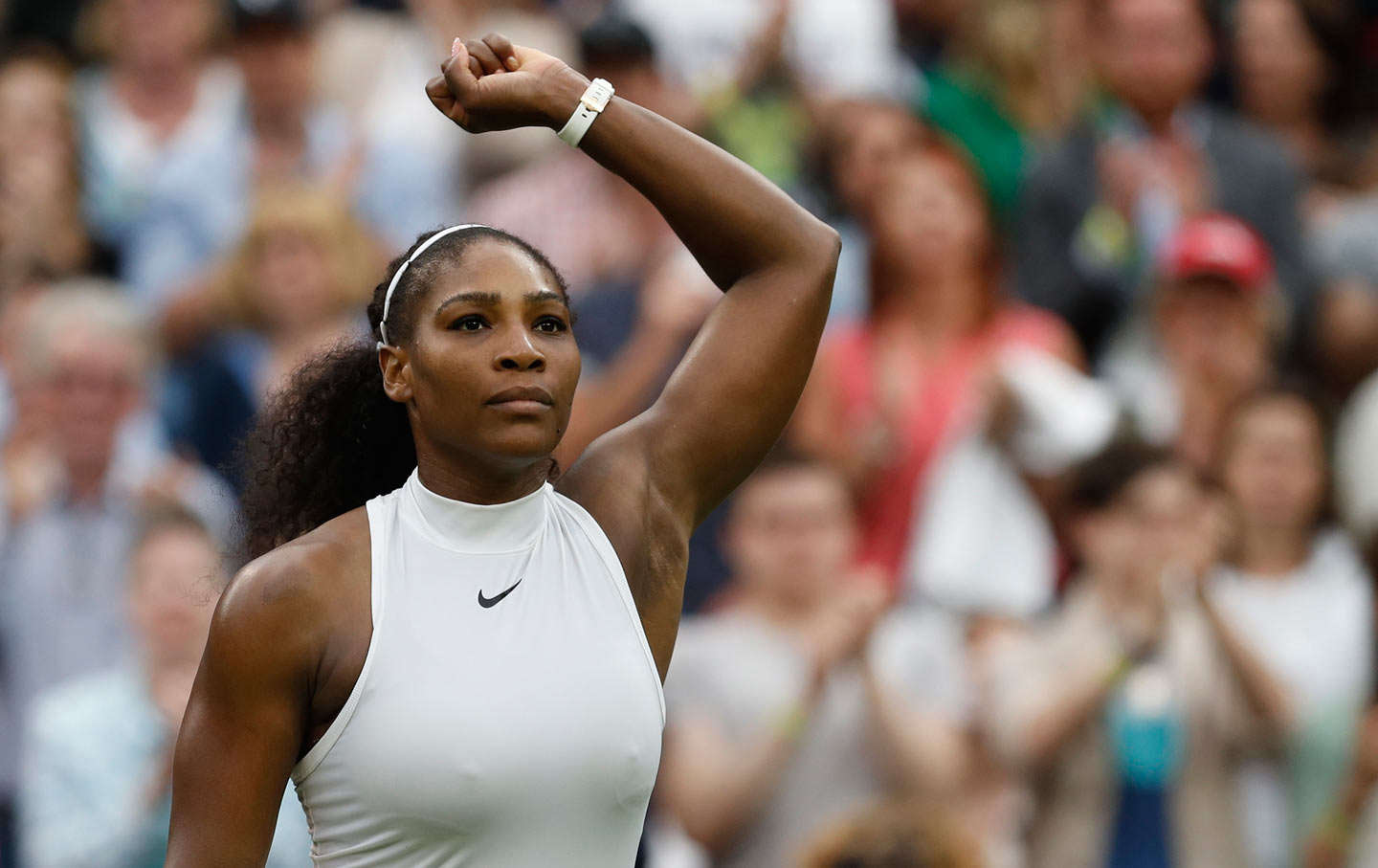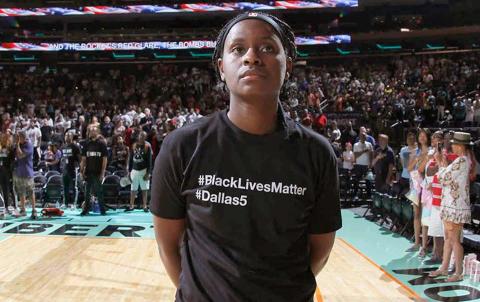The white men in sports could learn something from these women.
By Dave Zirin
July 11, 2016
In 2010, the entire Phoenix Suns team
wore shirts that read Los Suns as a statement of solidarity with the Latino people in Arizona threatened by the brutal anti-immigrant bill, SB 1070. That was the first time, according to my own research, that a professional US sports team undertook a united political stand that was sanctioned—or at least not shut down—by both coaching staff and upper management. Then in 2012, the Miami Heat
posed in hoodies to protest the killing of Trayvon Martin at the hands of George Zimmerman. In 2014, several NBA teams wore shirts emblazoned with the slogan “
I Can’t Breathe,”the last words of Eric Garner as he was being choked to death. Management may not have sanctioned these acts, but it sure as hell was not going to stop them.
Now two more teams have come together to make a political statement. The Minnesota Lynx and the New York Liberty of the WNBA have chosen to advocate an idea that really should not be radical but somehow is, in the United States of 2016: the idea that black lives matter. The Lynx wore jet-black warm-up shirts that read on the front, “Change starts with us—Justice & Accountability.” On the back of the shirt were the names Philando Castile and Alton Sterling, both shot and killed by police officers last week. Castile’s died just a short drive from where the Lynx play, in the suburbs of St. Paul. The back of their shirts had a small Dallas police star for the police officers killed last Thursday, right over the phrase, “Black Lives Matter.”
Before the game, team captains Maya Moore, Rebekkah Brunson, Lindsay Whalen and Seimone Augustus spoke to the media. Moore said, “If we take this time to see that this is a human issue and speak out together, we can greatly decrease fear and create change. Tonight we will be wearing shirts to honor and mourn the losses of precious American citizens and to plead for change in all of us.”
On Twitter, the team’s (white) coach Cheryl Reeve wrote, “To rebut BLM with ‘All Lives Matter’ implies that all lives are equally at risk, and they’re not. #BlackLivesMatter doesn’t mean your life isn’t important if you aren’t black—it means that Black lives, which are seen without value within White supremacy, are important.”
Then there is the New York Liberty. Before their game on Sunday against the San Antonio Stars, the entire team wore T-shirts with the words #Blacklivesmatter and #Dallas5 on the front and a blank hashtag on the back. That blank hashtag was, according to the indispensible WNBA blog Swish Appeal to show the importance of “creating a new hashtag everyday will help continue to spread the word.” But it could also have been a statement that too many black men and women have become, in death, hashtags, and we do not know the name of the next one, only that it is coming and will continue unless something changes.
After the game, five players walked into the media room and explained why they took this step. Liberty star Swin Cash said to the press, “My husband is 6-6, 220. If my husband gets pulled over when you look at him, does he make you scared? Is something going to happen to him? Those are things that go on in my head.”
These kinds of stances actually make a difference. They legitimize people’s anger and right to resist at precisely the moment when people in the mainstream media and politics are trying to disrupt and distort a growing movement. They also matter because these are public and visible displays of real solidarity: white players joining with their black teammates,wearing the same shirts and standing alongside them in a show of multiracial unity against anti-black bigotry.
The white men in sports could learn something from these women. Stand with your teammates. Take on some of the weight. Give them political cover as the haters and bigots descend upon them. It’s not complicated. If your team really is a family, then you should care about the lives of your sisters and brothers. The Lynx and the Liberty are showing what solidarity looks like. The men need to take a lesson.
Athletes Speak Out for #BlackLivesMatter
by Dave Zirin
July 8, 2016
Serena Williams raises her fist in victory at Wimbledon.
Reuters / Paul Childs // The Nation
Professional athletes have provided a flicker of hope during these agonizing days by speaking out against police violence. "Shut up and play" clearly doesn't fly when black bodies are falling at the hands of those whose job is to serve and protect. In fact, it's almost surprising now when football and basketball players-the two sports most dependent on black labor-don't speak out. We saw this after the killings of Michael Brown, Tamir Rice, and Eric Garner in 2014.
Now, after the filmed deaths of Alton Sterling and Philando Castile, athletes' statements-which have the potential to reach an audience far beyond the normal political blather-are starting up yet again. Here are six that I think are special:
The New York Knicks star unleashed a mini-manifesto about the need for athletes to speak out. The most potent-and perhaps even historic-part of his missive is when he wrote,"There's NO more sitting back and being afraid of tackling and addressing political issues anymore. Those days are long gone. We have to step up and take charge. We can't worry about what endorsements we gonna lose or whose going to look at us crazy. I need your voices to be heard. We can demand change. We just have to be willing to. THE TIME IS NOW. IM all in. Take Charge. Take Action. DEMAND CHANGE." Not since Muhammad Ali-whom Melo references earlier-has someone taken on the endorsers as a point of political pride. Granted, Ali said, "God damn the white man's money!" but it's a step in that direction: independence from those who seek to "brand" and muzzle athletes
Arguably the planet's most important athlete, she took a break from the middle of playing for a Wimbledon title to speak out. "In London I have to wake up to this. He was black. Shot 4 times? When will something be done-no REALLY be done?!?!" She then posted a description of what happened to Philando Castile. But beyond words, Serena also gave us a hell of an image on the Wimbledon's grass court,
raising her fist in the style of John Carlos and Tommie Smith from the 1968 Olympics. No official word yet on whether it was intentional, but few athletes are more self-aware about their representative power, and her intent is always to leave a mark.
The Wizards guard stood his ground in a manner rarely seen when athletes get pushback for their words. After posting the hashtag #blacklivesmatter on the same night the Dallas police officer sniper shootings took place, he was flooded with criticism, accused by Internet scolds of being "insensitive." He also was hit with #AllLivesMatter as a response. Beal did not issue a hurried apology. Instead, he wrote, "The issue at hand regards my race and I have every right to speak on it! If you don't like it, it's a big ass UNFOLLOW button on the top of my page! Saying all lives matter is like saying we all need air to breathe! We all know that!!!! Killing a cop is no better than a cop taking a life! Innocent black lives are being taken by those sworn to protect and serve, not murder! When does it come to an end? And you wonder why people rage? We aren't getting justice, just more body counts! People are getting sick of this sh*t! So yes, Black Lives Matter!"
The Heisman hopeful and LSU star running back posed wearing an Alton Sterling T-shirt. Fournette resonates because he plays in Baton Rouge, where Alton Sterling was killed. More importantly, he is a college athlete with far less protection to speak without fear of reprisal than the pros. Anytime a college football player shows some politics, it sends a shiver down the spine of the NCAA: a rickety, morally bankrupt multibillion-dollar nonprofit entirely dependent on the compliance of 18-22-year-olds.
The Minnesota Lynx coach tweeted, "To rebut BLM with `All Lives Matter' implies that all lives are equally at risk, and they're not.
#BlackLivesMatter doesn't mean your life isn't important if you aren't black-it means that Black lives, which are seen without value within White supremacy, are important." It's a strong, abjectly political statement, more direct than what other players and coaches in the WNBA have said. (
See this link). Plus, her local leadership following the killing of Philando Castile right outside of St. Paul has a powerful echo.
The last statement of note is from the Angels pitcher, who tweeted, "Pray for
#PhilandoCastile and
#AltonSterling families and then demand justice, my nephews are young black men and their future depends on it." Why does this comment resonate? He's a white baseball player. The response from white, male athletes, as well as any outrage from the world of Major League Baseball, has been close to nonexistent. As for baseball, after all these years, the sport still treats political activism with the respect of a Jose Bautista bat-flip.
One thing is clear: White athletes need to step it up. As
I've written before, it is absurd that the entire weight of speaking out against these racist murders is placed on the shoulders of black athletes. Black lives are under constant threat. If white athletes truly care about their black and brown teammates, if they really are a "family" like every squad says, then they should take some of the damn weight. They can learn a lesson from the white football players at Missouri who stood with their black teammates when they refused to play unless the school president, Tim Wolfe, was removed. Please listen up, white athletes: If you see what's happening, say something. Solidarity at this moment is not only key to winning a better world. It's a profound moral imperative.
[
Dave Zirin, The Nation's sports editor, is the author of eight books on the politics of sports, most recently, Brazil's Dance with the Devil: The World Cup, The Olympics, and the Fight for Democracy
. Named one of UTNE Reader's "50 Visionaries Who Are Changing Our World," Zirin is a frequent guest on ESPN, MSNBC, and Democracy Now! He also hosts his own weekly Sirius XM show, Edge of Sports Radio, and co-hosts The Collision: Where Sports and Politics Collide with former NBA player Etan Thomas (both available as podcasts). You can find all his work or contact him through his website EdgeofSports.com. Follow him on twitter @EdgeofSports.]



Spread the word